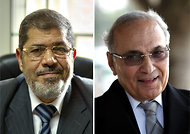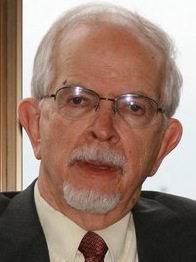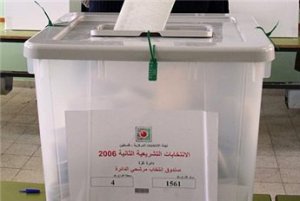It has been 25 years since Jewish historian, and Israeli critic, Simha Flapan, described the dominant narrative of the Israeli-Palestinian conflict in his 1987 book, The Birth of Israel: Myths and Realities.
"Even though Israel has the most sophisticated army in the region and possesses an advanced atomic capability, it continues to regard itself in terms of the Holocaust, as the victim of an unconquerable, bloodthirsty enemy. Thus whatever Israelis do, whatever means we employ to guard our gains or to increase them, we justify as last-ditch self-defense. We can, therefore, do no wrong. The myths of Israel forged during the formation of the state have hardened into this impenetrable, and dangerous, ideological shield."
At the time of its publication, Flapan's book was exhilarating to anyone who by the mid-1980s, was running up against what Flapan termed, Israel's "impenetrable, and dangerous, ideological shield."
This summer, that impenetrable wall has begun to show cracks of possible penetrability. Elections are currently moving forward in Egypt and Palestine, two voting publics Israel does not want to see emerge as unpredictable democratic neighbors.
Egypt, a country which borders Israel from the south, has long been a key Israeli ally. President Hosna Mubarak, the last military strongman to run Egypt, was just the partner Israel needed as a close neighbor.
Palestine? Well, elections were most certainly not in Israel's plans for the population which has refused to accept Israel's occupation.
Egyptians began voting for a new president this past week to replace the military committee which succeeded the ousted Mubarak. Results are not yet official, but it appears that the runoff in June between the two leading candidates, will involve Mohammed Morsi, the Muslim Brotherhood-backed candidate and Ahmad Shafiq, Mubarak's last Prime Minister.

Egyptian scholar and greatly respected blogger, Juan Cole, desccribes Shafiq (shown at right here) as a former Air Force general and aeronautical engineer who wrote a dissertation on the military uses of Outer Space.
Shafiq is also a former Egyptian minister of aviation. He brags, with justification it appears, about "the good job he did with Cairo's international airport."
Cole adds that "Shafiq is considered by many Egyptians, especially in the countryside, as the law and order candidate. Many voters dislike him because of his close association with the overthrown Mubarak regime."
Shafiq's presumed opponent in the next round of voting, Mohammed Morsi, (at left) is described by the Guardian as the candidate selected by the Muslim Brotherhood's Freedom and Justice party. Morsi is seen, according to the Guardian, as an uninspiring figure. He is backed, however, "by the best-organised political force in the country."
Morsi, 60, is an engineer who has taught in the US as well as at Egyptian universities. An expert on precision metal surfaces, he worked at the US agency, NASA, on the development of space shuttle engines in the early 1980s.
This will be Egypt's first democratic election. Palestinian elections are scheduled at some point later this year. That election will be the second exercise of democracy by Palestinains in the past decade.
The first was in 2006. (The picture above from Ma'an, is a ballot box from the 2006 election). When the outcome did not suit either Israel or the US, many elected Hamas legislators were promptly jailed by Israel. This was followed by a military conflict, encouraged by the US and Israel. As a result of that conflict, Hamas seized control of Gaza, while the Palestinian Authority became the ruling force in the West Bank.
Six years later, the governments of Gaza and the West Bank are prepared to hold their second legislative and presidential elections, under the watchful eye of the Palestinian Election Commission, which is chaired by retired Bir Zeit University president Hanna Nasser. The process of voter registration begins Monday.
Ma'an, the Palestinian News Agency, reported Saturday:
"The [Palestinian] Central Elections Commission will begin operating in the Gaza Strip on Monday [May 28], officials said. Yasser al-Wadia, the general coordinator for independent political figures, told Ma'an on Saturday that a delegation from the CEC will add between 250,000-300,000 new Gazan voters to the electoral register. The CEC would undertake its work with impartiality, al-Wadia added.
"Hanna Nasser, the head of the Central Elections Committee, told Voice of Palestine radio this week that the CEC would prepare offices and train employees ahead of necessary preparations to register voters.
"After the commission starts work in the Gaza Strip, President Mahmoud Abbas will begin consultations on a consensus government as previously agreed.
'Members of the new cabinet will be agreed upon within 10 days from the start of consultations. Then the unity government will operate for six months, during which time it will set a date for general elections."
Nasser, it should be noted, held the same position as chair of the CEC, in January, 2006, when the elections in Gaza and the West Bank were essentially nulified by the US and Israel.
Thomas Friedman, the New York Times columnist who roams the world looking for exciting business developments, paused this past week to offer his report on the current conditions facing Israel and the Palestinian Occupied Territories. He appears either uninterested or -- horrors -- not even aware, that Palestinian elections are in the final planning stages.
In his column, Friedman stuck to the current Israeli narrative with this overview paragraph:
"The Palestinians are divided between Hamas in Gaza and the Palestinian Authority in the West Bank, and both populations are tired. Moreover, economic conditions have improved in the West Bank in recent years, and the Palestinian Authority's security forces are keeping a tight rein on anti-Israeli violence. Aid from the U.S., Europe and the Arabs pays a lot of the authority's budget. Israel's security wall keeps Palestinian suicide bombers out. The U.S. election silences any criticism coming from Washington about Israeli settlements."
This is a narrative paragraph which begs for closer analysis:
Yes, the Palestinians are separated in Gaza and the West Bank, with power held by Hamas, in Gaza, and the Palestinian Authority in the West Bank. But tired? Well, yes, about as tired as you would expect from prisoners locked up for what threatens to become a permanent incarceration.
Friedman writes that PA forces are keeping tight rein on anti-Israeli violence. He should have said Israeli occupation forces are attempting to maintain its oppressive control over non-violent demonstrations by Palestinians, jailing those who are too effective.
And he actually says, in print, that "Moreover, economic conditions have improved in the West Bank in recent years." Economic conditions are better in Cell Block C? Not likely.
Is this where all that talk in religious circles about "invest, not divest" started? Living conditions for a few Palestinian millionaires have, no doubt, improved. Maybe Friedman has been reading too many Romney speeches where one learns that the rich want the rest of us to benefit from the market economy.
Finally, all you Friedman fans out there in the American peace camp (you know who you are), take careful notice of this casual, but revealing, sentence tossed into the middle of Friedman's column:
"Israel's security wall keeps Palestinian suicide bombers out."
Security wall, suicide bombers? Friedman accepts that old Israeli narrative trope, a "security wall," which is not for security, but is a land-grab of monstrous proportions, well beyond the original Green Line. He also continues to cling to the belief that the wall prevents "suicide bombers" from entering Israel.
That shows us that Friedman does not understand political tactics of the oppressed. When something doesn't work, stop doing it.
For Friedman and Israel, if something "works" it is always due to something Israel has done, an echo of Israeli-born scholar and critic, Simha Flapan's phrase from 1987, "We [meaning Israel] can, therefore, do no wrong."
Further into his column Friedman cites an April 23 New York Times oped which repeats the "security wall" canard in a discussion of peace, using the familiar "Peace Without Partners" theme. Less we forget when this one surfaced in the 1980s, "there are no partners for peace on the Palestinian side."
The authors of the piece cited by Friedman are Ami Ayalon, Orni Petruschka and Gilead Sher, who are, respectively, a former commander of the Israeli Navy and head of the Israeli domestic security agency (Ayalon), an Israeli entrepreneur (Petruschka) and a peace negotiator and chief of staff to the Israeli prime minister from 1999 to 2001 (Sher).
Here is the revealing (for those willing to take notice) paragraph by these Israeli would-be peace-makers. Highlighted key phrase added:
"Israel should first declare that it is willing to return to negotiations anytime and that it has no claims of sovereignty on areas east of the existing security barrier. It should then end all settlement construction east of the security barrier and in Arab neighborhoods of Jerusalem. And it should create a plan to help 100,000 settlers who live east of the barrier to relocate within Israel's recognized borders."
The security barrier has become Israel's latest Big Lie, replacing the "Green Line" because Israel did not draw the "Green Line." It did draw the "security barrier" by building a concrete wall on and through Palestinian land. This wall is designed to create Israel's latest "facts on the ground," cutting off villagers from farmlands, workers from work sites and medical personnel from hospitals.
The problem for Thomas Friedman, the New York Times, Israel, and Israel's friends in the US ruling classes, is that, in Secretary Don Rumsfeld's memorable phrase, "stuff happens," when you don't see the stuff coming.
This summer, elections are the stuff which are breaking out all around Israel. Ironically, Israel was planning its own election this fall, but Israel's Prime Minister Benjamin Netanyahu postponed his elections until after November with some cabinet adjustments. In November, US voters will either return President Barack Obama to the White House or replace him with Mitt Romney.
It is hard to measure which candidate will bring Netanyahu the most joy. But it is a good guess that a second-term president would be more stubborn in dealing with the Israel Lobby than a first-term president.
What should worry Netanyahu is that election "stuff" could happen in ways not to his liking in the US, Egypt, and in Palestine.
What should worry the rest of the world is that if elections which Netanyahu cannot nullify, do not go his way, there is always Israeli's threat to attack Iran.
The picture above, left, of the two Egyptian candidates, is a Getty photograph by Khaled Desouki/Agence France-Presse.






